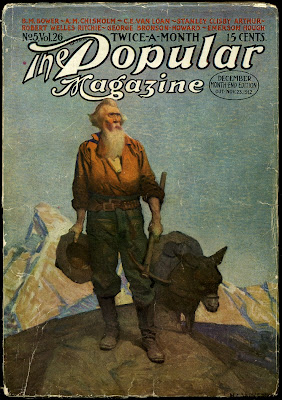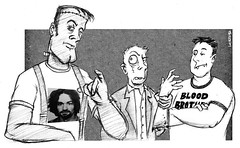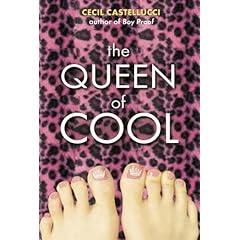As I was writing a comment over at Adam Roberts's blog (about which more in a moment), I realized I had various items of the last few days swirling through my head, and it all needed a bit of an outlet that wasn't a muddled comment on Adam's blog, but rather a potentially-even-more-muddled post here.
I don't have a whole lot to say about these things, and I certainly have no coherent argument to make, but they've congealed together in my mind, so here they are, with a few lines of annotation from me. Most of these things have gotten a lot of notice, but they haven't gotten a lot of notice together.
It's not that I don't think we're doomed and our culture insipid. I do. But it's been that way for a long time, especially in the United States. We're very good at being insipid and creating doom. Those are perhaps our greatest national talents. As Ta-Nehisi Coates recently said in a completely different context: "I expect the worst of everyone to win--and take humanity down with them. I get sad about that sometimes, but I am mostly resolved." That could be my credo. The way we live now is a J.G. Ballard novel.
Then there was Christopher Beha's blog post, reprinted by Slate, about how the New York Times Book Review should only cover "Holy Crap" books (hehehehe he wants them to write about crap hehehehe). Pretty much all of his assumptions are wrong, as Nick Mamatas gleefully pointed out, and his blazingly ignorant idea that fascinating writing about genrefied books is impossible can be disproved by such things as, for instance, some of the reviews at Strange Horizons, some of the reviews and writing at LA Review of Books, academic articles at such places as Science Fiction Studies, etc. etc. — but I basically agree with him in a more general sense, which is: it's nice to read long, thoughtful, insightful writing about challenging books, books that are hard to get a handle on at first glance. Which is one reason why I don't regularly go running to the New York Times Book Review for my litchat. It's a book review, the last one standing at a newspaper. If even a specialty publication like Bookforum has had to add shorter reviews, more media and political coverage, etc. to help maintain even a small audience, the NYTBR sure isn't going to follow Beha's advice — because his advice to the NYTBR is to commit suicide. They'd be better off putting a Jennifer Weiner novel on the cover.
Which brings us to Adam Roberts, who has a really provocative (well, to me) post up at his blog titled "On YA", but only partly about YA. My comment on the post gets to my disagreement with most everything I read him as saying. I am convinced I must be misinterpreting his ideas terribly, and I honestly look forward to him correcting me, because it looks to me like the Adam Roberts who caused a row about the mediocrity of the Hugo Awards in 2009 has now seen the light and found the Jesus of Popularity! Is! All! This cannot be true. I must be misreading him.
One of Adam Roberts's points is the counter opposite of Christopher Beha's — that the "genius of the age" in literature right now exists in the realm of genrefied fiction and, especially, YA. (Things get murky in the post because "genius of the age" seems to then get conflated with "popular". But, again, I must be misreading.) This is not a claim I can really discuss in an informed way, because I only occasionally read YA novels, and though some, like M.T. Anderson's first Octavian Nothing novel, seem to me among the great literature of our time, the field itself is really not my thing. Kameron Hurley explained well why she doesn't write or often read YA, and my feelings are similar: the sorts of things that typically fit a book into the YA market, and that are desired by YA readers, are not the sorts of things that make me want to read a novel. Inevitably, then, I will miss reading some extraordinary fiction, but we will all miss reading lots of extraordinary fiction because there is more extraordinary fiction out there than any of us have time to read. That is the curse of the reader. If Roberts is right and YA is the genius of our age, then the curse of our culture may be that it aspires to be a 16-year-old.
Roberts's whole argument seems to me to confuse cultural history, cultural analysis, and aesthetics. I'm not an art-for-art's-sake aesthetic puritan; I am completely convinced that how we interpret and value art is determined by other social and cultural values, but I do think there is a distinction — a valuable distinction — between the ways that we value a cultural product and the ways that a cultural product has power within a culture. Here's an example: I've spent the last year and a half or so watching, reading about, thinking about, and trying to write about American action movies from the 1980s. I think they're immensely culturally and politically important and can tell us a lot about the era. I don't think any of them are particularly good movies, though some have certain virtues, quite a few are fascinating to think about and analyze, and some are entertaining even after multiple viewings. They did, in fact, embody a certain genius of their age, the same sort of genius possessed by Ronald Reagan, although overall I think that genius was a pernicious one. But it was effective and we're still feeling the ripples in our culture and politics. That's no argument for the Oscar to have gone to Rambo II, though. Certainly, Rambo II is a far better exemplar of its time than any of the actual winners, but that's just because, as usual, the awards went to a bunch of ostentatiously mediocre movies. This was the year of Ran, Shoah, Brazil, and Come and See — masterpieces that mostly escaped Oscar's notice. But the point of the Academy Awards is not to hail masterpieces or find the movies that most embody the era: it's to congratulate Hollywood for being Hollywood. We look to the Oscars to see how Hollywood perceives itself. To ask for more is to misperceive how those awards work. Similarly, popularity (Rambo II, etc.) primarily shows us what masses of people consider potentially entertaining enough to spend money on. Movies like Ran, Shoah, Brazil, Come and See exist outside both lenses, as do the great books and music of whatever year. And by "great" I mean the socially-constructed-but-nonetheless-perceivable-across-multiple-eras-and-geographies complexity and individuality that distinguish, say, Kafka from the bestselling novels in the U.S. in 1924.
I thought of these three writings by these three writers (Franzen, Beha, and Roberts) together because there seems to be some sort of conversation to be had among them and their respondents about how we value culture and what we get from it, particularly either cult or elite art — which may be the same things, a cult being a kind of elite and an elite being a kind of cult. Being me, I would also want to add in more about cultural capital, and seek out areas of agreement while also asserting that, of course, we are doomed ... but really I'm just indulging in a fantasy: what if our three boys were stuck on a stage together in front of an audience? What might they talk about? Or, even better, what if we put them in a room with some YA novelists, crime and romance and SF writers, people published by FC2 and Dalkey Archive, former jury members of various awards, VIDA members, members of the Carl Brandon Society, some high school English teachers, at least a few librarians, passionate David Eddings readers, a couple of anarcho-communists, some radical queers, and a few random people off the street ... what directions might the conversation take then...?
My brain begins to melt just thinking about it.













 She's been feeling a little weird lately, though she hasn't quite figured out exactly why.
She's been feeling a little weird lately, though she hasn't quite figured out exactly why.
Your comment: “the curse of our culture may be that it aspires to be a 16-year-old” reminds me of George WS Trow’s similar statement in “The Context of No Context” (1980) : “The mode of authority in America, the mode that deals with real experience, the mode that is neither dead (as the adult mode seems to be) nor compromised (as the childish world of television seems to be), is the adolescent mode—the mode of exploration, becoming, growth, and pain.”
- matthew davis
What a great quote! Thanks. And it highlights that our cultural obsession with adolescence goes far back, which is one reason why books about kids (Huck Finn) or people stuck in an childish/adolescent mindset (The Great Gatsby) feel so accurate in capturing important elements of the American psyche and mythos. (See also Gaddis's JR and Millhauser's Edwin Mullhouse.)